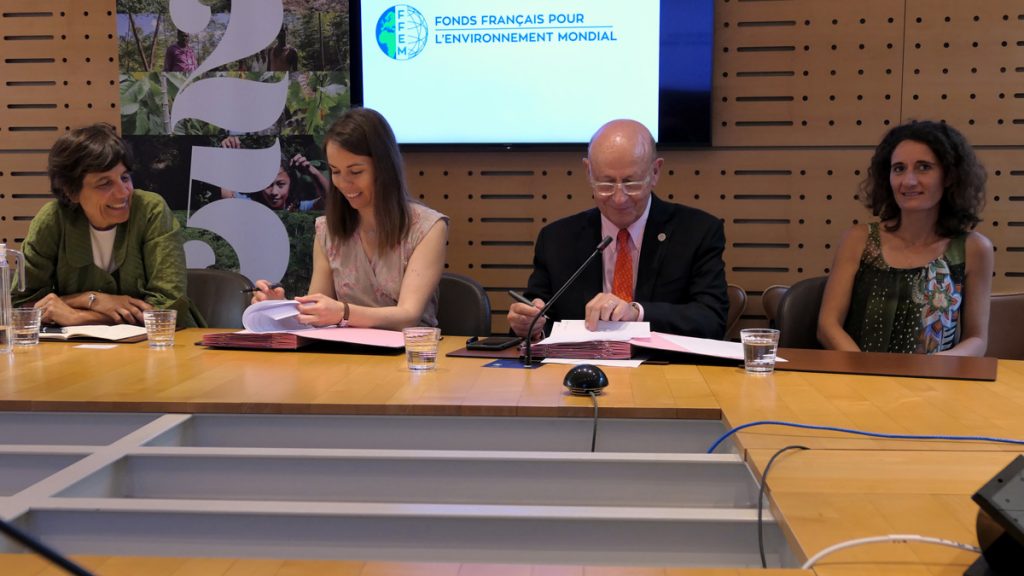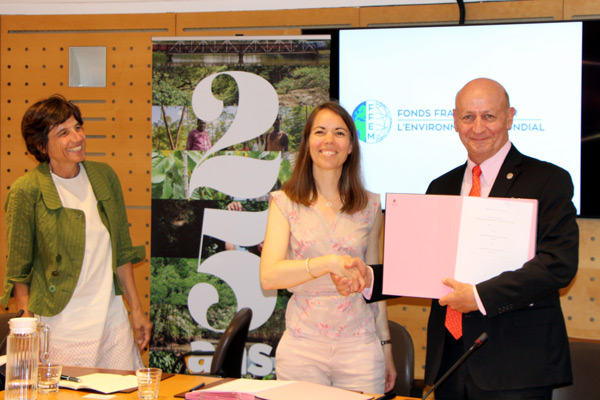 From left to right: Constance Corbier-Barthaux, Project Manager for MAR Fund; Stéphanie Bouziges-Eschmann, FFEM Director; Lorenzo Rosenzweig, MAR Fund President and Director of the Mexican Fund for the Conservation of Nature; Stéphanie Belna, Minister of Ecological and Solidary Transition.
From left to right: Constance Corbier-Barthaux, Project Manager for MAR Fund; Stéphanie Bouziges-Eschmann, FFEM Director; Lorenzo Rosenzweig, MAR Fund President and Director of the Mexican Fund for the Conservation of Nature; Stéphanie Belna, Minister of Ecological and Solidary Transition.Original article available here:
On Tuesday, June 25, the French Fund for the Global Environment (FFEM in French) signed a new financing agreement with the Mesoamerican Reef Fund (MAR Fund), on this occasion for the project “Knowledge, Monitoring and Protection of Mesoamerican Reef´s Fish Spawning Aggregations (MAR Fish)”. During the ceremony, held at FFEM in Paris, copies of the financial agreement for €.1.115.800 were signed by Stéphanie Bouziges-Eschmann, FFEM Director, and Lorenzo Rosenzweig, MAR Fund President and Director of the Mexican Fund for the Conservation of Nature.
The objective of this three-year project is to promote the recovery of fish populations in the Mesoamerican Reef System (MAR), shared by Mexico, Belize, Guatemala and Honduras, by strengthening protection and monitoring of a regional network of spawning – or reproduction – areas of commercial species.
“Fish spawning aggregations (FSA) are massive concentrations of fish that come together for reproduction purposes and are critical for the survival of the species.. Predictability of FSA in time and space and the large number of fish that gather, make them important fisheries sites and considerable sources of income for local communities. Unfortunately, these same characteristics frequently make them sensitive to fishing pressure; huge amounts of fish may be caught in a short period of time, and the global decline of FSA is associated to generalized excessive fishing”, according to the document Fish Spawning Aggregations, a focal point for fisheries management and marine conservation in Mexico, produced by Comunidad y Biodiversidad (COBI), one of the partner organizations of the project.
As indicated in COBI´s document, the importance behind valuing and protecting FSA is that they stock fisheries, which contribute to food security of local citizens and support the livelihoods of millions of people in the world. Fishing pressure along the MAR has contributed to a 23% drop in commercial fish biomass in the Healthy Reefs Initiative (HRI) study sites, as stated in their 2018 report card. However, the report card also states that commercial fish biomass has doubled in areas where fishing is not allowed. This is a potential option to consider, in the future, for the FSA in the MAR.
Participating organizations
The MAR Fish Project is coordinated by MAR Fund, a private regional environmental fund. It will be implemented with the participation of eight main partners: HRI; Foundation for Eco-development and Conservation (FUNDAECO); the Toledo Institute for Development and Environment (TIDE); Southern Environmental Association (SEA); Environmental Defense Fund (EDF); Coral Reef Alliance (CORAL); Rotary International, and COBI.
MAR Fund thanks FFEM for its trust and support in this project that will be greatly beneficial for the coastal communities and the ecosystems sustained by the MAR.
 Left to right: Constance Corbier-Barthaux, Project Manager for MAR Fund; Stéphanie Bouziges-Eschmann, FFEM Director, and Lorenzo Rosenzweig, President of MAR Fund and Director of the Mexican Fund for the Conservation of Nature.
Left to right: Constance Corbier-Barthaux, Project Manager for MAR Fund; Stéphanie Bouziges-Eschmann, FFEM Director, and Lorenzo Rosenzweig, President of MAR Fund and Director of the Mexican Fund for the Conservation of Nature.